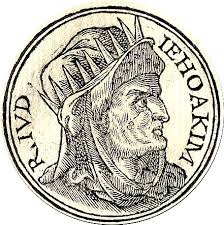Jehoiakim Ruled For 11 Years
from 609/608 to 598 BC

Jehoiakim, Josiah’s second son was 25 years old when Necho II, Pharaoh of Egypt, placed him on the throne. He reigned 11 years until 598 BC (Second Kings 24:7 to 25:36; Second Chronicles 36:5-8). Earlier in 609, after Josiah was killed, the people chose Jehoahaz as the new king of Judah. He was, however, an evil king and reigned only 3 months when Necho II summoned him to Riblah. There, Jehoahaz was captured and taken back to Egypt.
Josiah’s purge of false gods came to a sudden stop when Jehoiakim became king. In fact, Jehoiakim and his pro-Egyptian party seem to have made a deliberate attempt to reverse the reform movement. Yirmeyahu is not mentioned in connection with the purge. In fact, the only reference to Jeremiah’s prophetic activity is in Second Chronicles 35:25, which reports that the priest from Anathoth made a lament for Josiah after his death.111
For the next several years, from 609/608 to 606 BC, Judah was under Egyptian domination. Pharaoh personally appointed Jehoiakim, another son of Josiah, as his vassal king and plundered the treasuries of Tziyon. Jehoiakim was his throne name, but Eliakim was his personal name. He was very extravagant and built a fine palace for himself with forced labor (22:13-19). But more damning, he allowed Josiah’s reform to lapse and played into the hands of those who had always opposed it to begin with. He remained a loyal vassal to Egypt and was a poor substitute for his father who had sought God with his whole heart.
In 605 BC Jeremiah first declared that Isra’el would serve the king of Babylon for seventy years (to see link click Dd – Isra’el Will Serve the King of Babylon Seventy Years).
For four years the Babylonians tried unsuccessfully to secure positions near Carchemish, to dislodge the Egyptians. Then in the summer of 605 BC, General Nebuchadnezzar made a surprise attack on the Egyptians at Carchemish, dealing them a stunning defeat. Jeremiah 46:3-12 is a poem in which the prophet mocks the weakness of the Egyptian army in that decisive battle (see Dh – A Message Concerning Egypt).
In August of 605 BC the Babylonian advance was delayed by Nabopolassar’s death, but only briefly, for by September Nebuchadnezzar had returned home to succeeded his dead father. Suddenly Egypt was no longer a power and the Babylonian army marched down the coast of Palestine and destroyed the city of Ashkelon (Jeremiah 47:1-7) the last remaining stronghold of the Philistines – only forty miles west of Jerusalem. Seemingly overnight Babylon had replaced Egypt as the great power in the region. Soon Jehoiakim would be forced to switch sides and become a vassal to Babylon (Jeremiah 46:2; 2 Kings 24:1-7; Second Chronicles 36:6). During Jehoiakim’s reign, King Nebuchadnezzar of Babylon invaded the land of Judah.
By the fall of 605 BC Nebuchadnezzar conquered Jerusalem and took the first deportation of exiles (and some of the Temple articles) back to Babylon (Dani’el 1:1-7). The Babylonian king took “hostages” to assure continued loyalty. One of the most important “hostages” taken was a godly young man named Dani’el.
Back in Yerushalayim, after each of the first three deportations, the pro-Egypt party was hard at work. They always seemed to think that if they could just align Judah with Egypt they would be protected. This never materialized, but they kept trying.
In 605 BC Yirmeyahu begins to dictate his prophecies to Baruch.
In 605/604 BC Jeremiah’s scribe, Baruch, read the scroll dictated to him by the prophet to Jehoiakim. But the king of Judah defiantly burned it up (see Df – Jehoiakim Burns Jeremiah’s Scroll). Here was a shift. Up to that point the purpose of the scroll had been to warn. But Jehoiakim did not respond to the warning. He burned it. How could the people respond if the king, who represents the people, fails to respond? The king’s burning of the scroll was the catalyst for the shift in Jeremiah’s perception: no longer are the scenarios of the enemy from the north merely scenarios, plans, or possibilities in God’s hands. No . . . now YHVH will irrevocably set the plan in motion.
In 603 BC Ekron (Tel Miqne) was destroyed.
In 602-601 BC Jehoiakim remained a loyal vassal to Babylon until late in 601 BC. At that time Nebuchadnezzar made another advance through Palestine. His objective was to conquer Egypt, but his goal was not achieved. Both sides suffered heavy losses. Egypt may have even been the victor. In any case, the Babylonian army retreated back to Babylon, after which the pro-Egyptian party gained the upper hand in Jerusalem and Jehoiakim switched sides again, this time he supported Egypt, and rebelled against Babylon (Second Kings 24:1b-2) and refused to pay tribute to Nebuchadnezzar. Bad career decision. Jehoiakim was not a very wise political chameleon. He had switched allegiance from Egypt to Babylon in 605 BC with Nebuchadnezzar’s victory over Necho II at Carchemish.
By December of 598 BC ADONAI sent Babylonian, Aramean, Moabite and Ammonite raiders against Jehoiakim to destroy Judah, in accordance with the word of the LORD proclaimed by His servants and prophets (Second Kings 24:2). As the Babylonians were approaching to besiege Jerusalem . . . Jehoiakim conveniently died. We don’t know exactly how it happened, but since he was rebelling against powerful Babylon he might have been assassinated (22:18-19; 36:30) in the hope that Judah might be disciplined lightly. Perhaps she was, for Jerusalem and the Temple were not destroyed. Nebuchadnezzar only wanted to teach Judah and other vassal nations the awful consequences of rebellion against Babylon. Hence, the Babylonian king took 3,023 Jews as a warning against further rebellion (52:28).



Leave A Comment